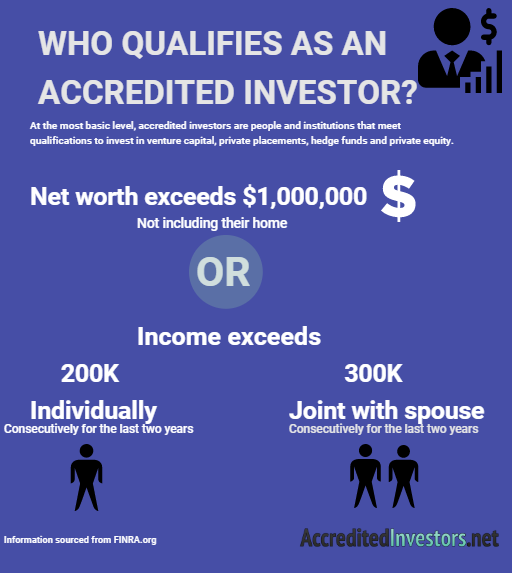- August 26, 2013
- Posted by: John Fischer
- Category: Accredited Investors
Private placement offerings are regulated under Regulation D, under the Securities Act of 1933. The SEC regulates the sale of securities and takes enforcing its guidelines very seriously. The Act provides companies with a number of exemptions that prevent a company from having to officially register their offering like they would when going public. In order to take advantage of the Reg D exemption companies must follow the guidelines set forth by the SEC, the primary of which is selling to Accredited Investors. When raising capital through a private offering it is important to understand how the Securities and Exchange Committee (SEC) defines an accredited investor / Accredited Investors Defined.
Here is the SEC’s posted Accredited Investors Defined:
- A bank, insurance company, registered investment company, business development company, or small business investment company;
- An employee benefit plan, within the meaning of the Employee Retirement Income Security Act, if a bank, insurance company, or registered investment adviser makes the investment decisions, or if the plan has total assets in excess of $5 million;
- A charitable organization, corporation, or partnership with assets exceeding $5 million;
- A director, executive officer, or general partner of the company selling the securities;
- A business in which all the equity owners are accredited investors;
- A natural person who has individual net worth, or joint net worth with the person’s spouse, that exceeds $1 million at the time of the purchase, excluding the value of the primary residence of such person;
- A natural person with income exceeding $200,000 in each of the two most recent years or joint income with a spouse exceeding $300,000 for those years and a reasonable expectation of the same income level in the current year; or
- A trust with assets in excess of $5 million, not formed to acquire the securities offered, whose purchases a sophisticated person makes.
Issuers that are looking to raise money through a private offering need to be able to verify whether or not their investors are accredited in order to stay within the rules and guidelines of the SEC. With the SEC now allowing companies to advertise their private offerings those guidelines are now more detailed. Previously investors could attest to being accredited. Now the SEC will require verification through a third party source including financial documents like tax returns or a statement by a CPA. Any companies advertising a private offering need to understand these regulation changes.
Even more significantly as crowd funding sites get more popular, and as the SEC is examining the way of regulating the sale of shares through these means, due diligence is going to become more and more important for companies. Having access to accredited investors is going to become vital to keeping within the ratios of accredited versus unaccredited investors as set forth in the SEC. How the industry, crowdfunding, will rise to the challenge of meeting the changes to Regulation D is yet to be seen. This sums up how an Accredited Investors Defined.
